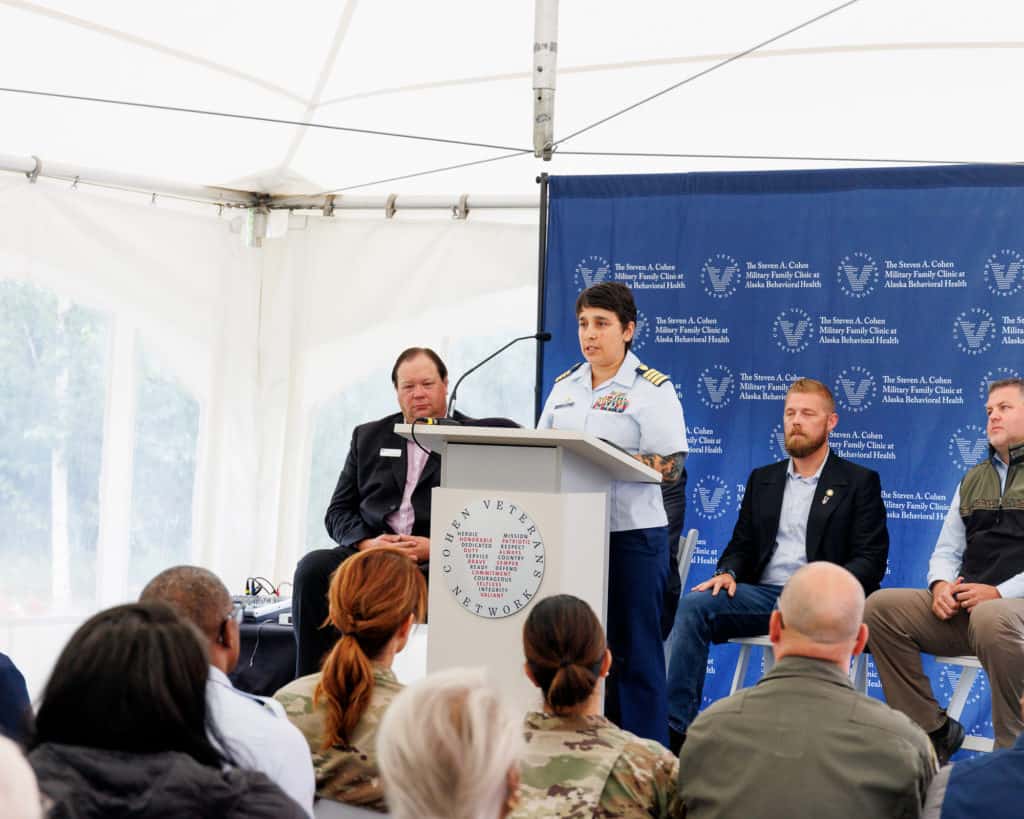If you were to ask the U.S. Coast Guard’s Capt. Leanne Lusk what keeps her up at night, she would tell you it’s knowing her command members could be suffering in silence without getting the help they need to address their mental health.
Lusk has served as Commander of Coast Guard Sector Anchorage for two years. In her role she is responsible for Coast Guard members stationed in Anchorage and ten units located in Valdez, Homer, Seward, Kodiak, and Dutch Harbor, Alaska. During her time in command, and pre-command positions the few years prior, Lusk says, having someone you are responsible for die by suicide is one of the most significant worries.
She shared that the 2015 loss of a member of her field unit to suicide while he was on duty tore apart the team at the small boat station for years. Lusk added, she has since seen two more Coast Guard members attempt suicide, with even more expressing suicidal or homicidal ideations. Lusk spoke at The Steven A. Cohen Military Family Clinic at Alaska Behavioral Health community celebration on July 12.
“My biggest challenge as a command member has been trying to eliminate the barriers that prevent our members from getting the help they need, when they need it. Barriers like requesting a referral that you never hear back on, making the one phone call to ask for help and realizing that even though you are finally asking, you have to continuously follow up and painfully advocate for yourself at each step of the process when you can barely get out of bed in the morning,” Lusk said.
In her search for behavioral health help for her command members, Lusk says she was introduced to the Cohen Clinic at Alaska Behavioral Health Director MaryBeth Goodman, as well as Outreach Director Taylor Waldner.

Here’s more from Lusk’s speech at the Cohen Clinic in Anchorage’s Community Celebration:
“We have gotten to the point where every member who checks into Sector Anchorage receives a Cohen Clinic brochure. We routinely talk about behavioral health support as a method of self-care and caring for our loved ones. Both MaryBeth and Taylor have traveled to several of our field units in remote locations to inform our crew of telehealth services, and MaryBeth has even provided in person support for my watch standers following difficult search and rescue cases late at night or on weekends, and traveled to provide support to a Coast Guard community and their families in the aftermath of an unexpected death of one of our Coast Guard members at a field unit.
The care and support the Anchorage Clinic provides to our Coasties and their families is truly unique and is more than I ever hoped for as a major unit commander. I trust this team with the lives of my crew and their loved ones. The excellent support, frequent interactions, and consistent exposure to the various services offered has effectively reduced the stigma for our Coasties at Sector Anchorage and our field units. My crew members have shared their positive experiences with others, and more Coasties throughout Alaska are seeking behavioral health services! I call that a win!
I am incredibly grateful to Steven A. Cohen for creating the Cohen Veterans Network, and to Dr. [Anthony] Hassan and MaryBeth and her entire team for making accessible care possible for our active duty, veterans, and their families. As a unit commander responsible for ensuring my people have what they need to get our missions done safely, I finally feel comfortable knowing behavioral health resources are available for my crew when they need it. I really couldn’t ask for better support for my people. Sincerely from the bottom of my heart, thank you to the Cohen Clinic team for making that possible!
By Liz Palka
CVN Clinic Communications Manager
